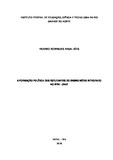A formação política dos estudantes do ensino médio integral do IFRN - CNAT

Visualizar/
Data
2016-07-01Autor
Magalhães, Ricardo Rodrigues
http://lattes.cnpq.br/0270551679016078
Metadado
Mostrar registro completoResumo
ABSTRACT
The process of globalization, financialization and the flexible accumulation form are intrinsic aspects of the diversification of the capitalist mode of production, shifting values and concepts from the society to the economic aspect. The simple, parceled and precarious work brings a perspective linked to the new cultural identities of gender and professional ones, greatly interfering in the management of the educational institutions, limiting it to an uncritical understanding of the students’ political formation. Therefore, the objective of this research is to investigate the relationship of the students’ political formation and the school management, and it was carried out at IFRN-CNAT between 2001 and 2016. From the Integrated Professional Education to the Secondary School, the critical political education of the young people is an essential element to the construction of the individuals’ freedom, fundamental aspect of the education, necessary to promote the full exercise of the citizenship, thus, justifying the choice of this theme. The study was carried out through a qualitative field research combined to a quantitative method, also bibliographical, documentary and anchored in the guiding principles of the dialectical and historical materialism. The study subjects were 51 students from 3 courses of the Integrated Secondary School, who answered an electronic questionnaire, and 4 school managers, who were interviewed. From the collected information, analyzed through associations to the theoretical framework and through explanatory inferences, we concluded that the public policies of the professional education are characterized by fragmentation, discontinuity and switchbacks, and are affected by the irrational rationality of the school management. The IFRN-CNAT, in offering the Integrated Secondary School, provides the minimal instrumentation for humanization, being able to prepare young people to achieve the complex synthesis of the concrete, compatible with a revolutionary vision of prioritization of the ethnic and gender elements, and of the minorities. There is also the recognition of the interference of the school management paradigm in the political education of the students. At IFRN, although limitations imposed by the capitalist mode of production and the intentionality in the relationship between education and political participation coexist, the aspiration to the social transformation is observed. Therefore, we understand that the IFRN-CNAT provides the students with the minimum
knowledge in order to promote the consolidation of a new hegemony, once, without the historical and dialectical understanding of reality, the possibility to critically understanding the gears of the capitalist world is remote.
Keywords: Political Education and Participation; Professional Education; Integrated Secondary School.



